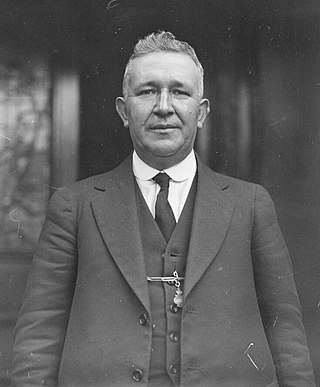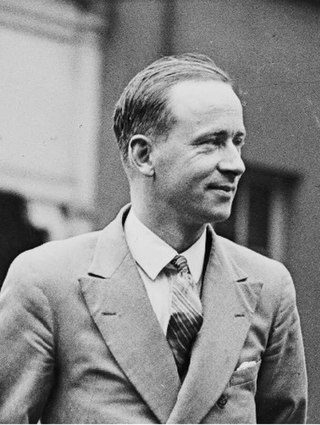Related Research Articles

John Joseph Cahill, also known as Joe Cahill or J. J. Cahill, was a long-serving New South Wales politician, railway worker, trade unionist and Labor Party Premier of New South Wales from 1952 to his death in 1959. Born the son of Irish migrants in Redfern, New South Wales, Cahill worked for the New South Wales Government Railways from the age of 16 before joining the Australian Labor Party. Being a prominent unionist organiser, including being dismissed for his role in the 1917 general strike, Cahill was eventually elected to the Parliament of New South Wales for St George in 1925.

Carlo Camillo Lazzarini, also known as Charlie Lazzarini, was an Australian politician affiliated with the Labor Party. He was elected as a member of the New South Wales Legislative Assembly, where he served for 35 years.

Reginald Walter Darcy Weaver was an Australian conservative parliamentarian who served in the New South Wales Legislative Assembly for 28 years. Serving from 1917 in the backbenches, he entered the cabinet of Thomas Bavin in 1929 as Secretary for Mines and Minister for Forests until he returned to opposition in 1930. Following the success of the United Australia Party in the 1932 election, Weaver returned as the Secretary for Public Works and Minister for Health in the Stevens ministry.
A political family of Australia is a family in which multiple members are involved in Australian politics, particularly electoral politics. Members may be related by blood or marriage; often several generations or multiple siblings may be involved.
Kevin Joseph Moss is an Australian politician. He was a Labor Party member of the New South Wales Legislative Assembly from 1986 to 2003, representing the electorate of Canterbury.
× Members of the New South Wales Legislative Assembly who served in the 37th parliament held their seats from 1953 to 1956. They were elected at the 1953 state election, and at by-elections. The Speaker was Bill Lamb.
George Weir was an Australian barrister and politician who was a member of the New South Wales Legislative Assembly from 1941 to 1953.
Christopher Augustus "Gus" Kelly was an Australian politician. He was a Labor Party member of the New South Wales Legislative Assembly from 1925 to 1932 and again from 1935 until his death in 1967, representing the electorate of Bathurst. He held numerous ministerial positions between 1941 and 1965 in McKell Labor Government.

Major Clarence Edward Martin was an Australian politician and a member of the New South Wales Legislative Assembly from 1930 until 1932 and from 1939 until his death in 1953. He was variously a member of the Australian Labor Party (NSW), the Industrial Labor Party and the Labor Party (ALP). He was the Attorney General of New South Wales from 1941 until 1953 and also held the position of Minister for Transport for six months prior to his death.
Heathcote Clifford Mallam was an Australian politician and a member of the New South Wales Legislative Assembly between 1953 and 1968 and between 1971 and 1981. He was a member of the Labor Party (ALP).
William Matthew Rigby was an Australian politician. He was a Labor Party member of the New South Wales Legislative Assembly from 1959 to 1965, representing the electorate of Hurstville.
Joseph Patrick Byrne was an Australian politician. He was a Labor Party member of the New South Wales Legislative Assembly from 1930 to 1932, representing the electorate of Parramatta.

Thomas Tunnecliffe was an Australian politician. Representing the Australian Labor Party, he was a member of the Victorian Legislative Assembly for the electorates of West Melbourne (1903–1904), Eaglehawk (1907–1920) and Collingwood (1921–1947).

Francis Michael Burke was an Australian politician.
John Thomas Ness was an Australian politician.

The Cahill ministry (1953–1956) or Second Cahill ministry was the 56th ministry of the New South Wales Government, and was led by the 29th Premier, Joe Cahill, of the Labor Party. The ministry was the second of four consecutive occasions when the Government was led by Cahill as Premier.

The Cahill ministry (1956–1959) or Third Cahill ministry was the 57th ministry of the New South Wales Government, and was led by the 29th Premier, Joe Cahill, of the Labor Party. The ministry was the third of four consecutive occasions when the Government was led by Cahill, as Premier.

The Cahill ministry (1959) or Fourth Cahill ministry was the 58th ministry of the New South Wales Government, and was led by the 29th Premier, Joe Cahill, of the Labor Party. The ministry was the fourth and final of four consecutive occasions when the Government was led by Cahill, as Premier.
Francis Patrick Buckley was an Australian politician.
A by-election was held for the New South Wales Legislative Assembly seat of Dulwich Hill on 20 June 1953 because of the resignation of George Weir (Labor) to accept an appointment as a judge of the New South Wales Industrial Commission.
References
- ↑ "Mr Francis Patrick Connors". Former members of the Parliament of New South Wales . Retrieved 22 May 2019.
- ↑ Green, Antony. "Index to candidates". New South Wales Election Results 1856-2007. Parliament of New South Wales . Retrieved 30 April 2019.